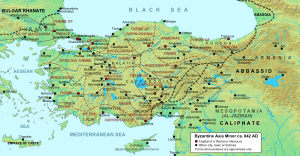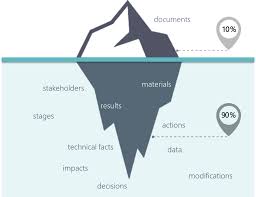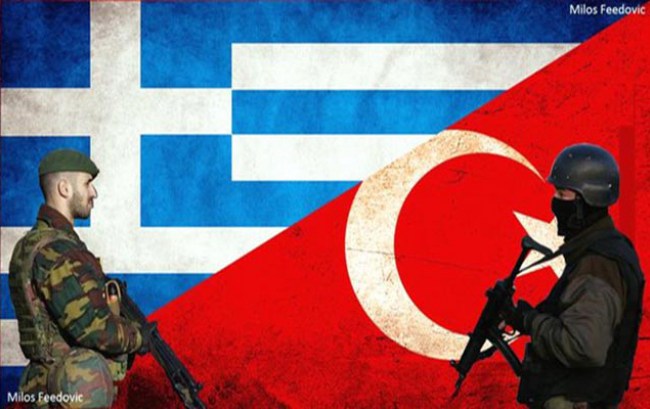
The second part of a review on historical events that lead to conflicts between Greece and Turkey over Aegean Sea, the Aegean island and Cyprus in an effort to provide a point of view that could be considered as neutral as possible considering that I am Greek and both sides of my family came to Greece as refugees after the defeat of the Greek army during 1922.
In part I of this article I tried to cover the period from the fall of Constantinople during 1453 to the Greek upraise against the Ottoman Empire during 1821.
In the first part I referred, mainly to the way Ottoman administration treated its subjects, mainly of Christian religion. The oppressive ways reached to extreme situations in the Greek mainland and Crete where heavy taxes were imposed and the practice of “grabbing” Christian children, which was probably the worst wound for Hellenism, since these children were going to become “janissaries”, the most well trained part of the Turkish army, usually confronting Greek populations and revolutionaries.
In the second part of this article I want to concentrate on events following 1821 fight for Greek independence, the Balkan wars, the defeat of the Greek army following the invasion of Asia Minor, the fate of Greek population that suffered terrible atrocities, mass killings and deportation of 1.5m people from their homes, up to contemporary periods when conflicts still prevail over Cyprus the Aegean sea and the Islands.
The influence of Renaissance and the French revolution.
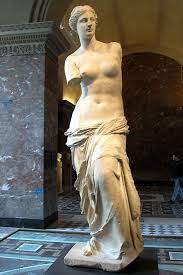
Before I proceed with a description of the actual events over this period I think it will be a mistake if I don’t, mention the influence that Renaissance had on Greeks living under Turkish rule around 400 years, during medieval times, as well as the effect that the French revolution had in the European states which inevitably influenced Greece and other national movements in the Balkans.
It would have been very difficult for Greece to regain its national identity just as a reaction to Ottoman oppression, even suffering cruelty, if it was not for the freedom Greek Tradesmen acquired with the help of Greek ship-owners, who managed to grow in the Aegean Islands.
From the 17th century Greeks from the islands, Asia Minor even as far as Caucasus, the Black sea and the rest of the Balkans developed a strong commercial power that, in turn, produced a generation of scholars who benefited by the cultural explosion that was taking place in the rest of Europe. It would have been a very strange development if the West, which was finding its way out of the dark medieval period, rediscovering classical Greece, to leave untouched this generation of Greeks. Hence the explosion of the just anger from the Ottoman oppression came to meet the cultural revolution of the generation of Greek tradesmen and scholars who grew, either within Ottoman Empire or in “Diaspora”. This coincidence generated the spirit for independence, which started from Greece but, very quickly, spread over the rest of the Balkans.
Conflict of cultures
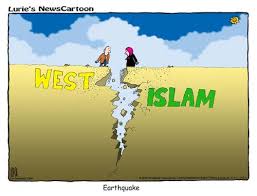
The fact is that Greece happened to be in the middle of a wider “clash” of cultures, between East and West, which include religious aspects, other issues involving national and imperialistic aspirations from every side, commercial and political interests all of which, inevitably, involve Greece.
Every such involvement had both positive and negative side effects.
Every military conflict between West and Turkey was creating an expectation for the Greek independence. As consequence, every conflict between Turkey and West was followed by Turkish retaliations with real “blood baths” for innocent as well as revolting Greeks. The Turkish response to these accusations for retaliations that were disproportional expose the Turkish cruel way of thinking, so they say: What do you expect?
There were several uprisings, not only in Peloponnese but also in Macedonia and in many other areas, including many of the islands such as Chios Island, Crete etc. The massacre in Chios Island inspired the French painter Delacroix who helped to make the Turkish atrocities well known all over Europe creating a lot of sympathy for the Greek cause.
An early Greek uprising took place after the Battle of Lepando (between Venetians and Turks), as early as (October 7th, 1571) that ended in massacres of the Greek population,
This was repeated many times i.e., during the Russian war with Turkey (Orlof Brothers and Crimean wars).
Hence Turkey cannot claim that Greeks lived as happy subjects of Ottoman Empire, or even that they did not maintain their national identity.
Yet, there is a question that is still bothering me, why Turks still maintain such animosity with Greece even today? There were many European nations that managed to overcome national conflicts that caused many battles, even two World Wars. What is so special, unsurpassed with the problem between Greece and Turkey?
I believe that Turkey never overcame the shock of their defeat during the Balkan Wars, especially from Greece. This led to serious national hate and consequently to extermination of all Christian population from Asia Minor, following the defeat of the Greek army after the invasion. An invasion which was encouraged by Great Britain and other western powers, allies during the First World War
But even this Turkish victory during 1922 did not seem to satisfy the Turkish side, this may be an additional reason why Turkey currently adopts a revisionary approach. Turks are still nostalgic of the greatness of their past and feel betrayed, pushed in the corner against West.
Greece, for Turkey, is, once more, the instrument of West. Even if Greece was supportive for Turkish entry to European Union, Turkey still retains aspirations in Aegean, the islands, Cyprus, east Mediterranean and may be even West Thrace.
Turkey cannot forget their outdated practices on minority rights and comes in conflict with other European standards regarding civil and other human rights hitting back with actions that damage the heart of Christian Orthodoxy, otherwise why they have closed the High School for Orthodox Clergy in the island of Chalki that deprives the Ecumenical Patriarch of succession in the existing ecclesiastic hierarchy? This attitude in no way complies with European or even international standards for freedom of religion in the civilized world.
But, let’s go back to the events covering the period from 1821 to current situation that seriously threatens new conflicts, even the braking out of a new full scale war between our countries. .
Aegean Sea and the islands according to international treaties
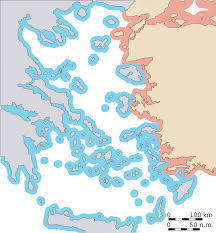
I will start, this time, from an analysis on Aegean Sea and the Turkish claims on the sovereignty of certain islands, what Turkey is bringing up as “gray areas”.
International community is confused with this situation especially when they hear Tayip Erdogan to proclaim: “Turkey is bigger than…. Turkey, we cannot be restricted within the existing 720.000 square km. Turkey’s frontiers are within the physical and other “Frontiers of our heart”
This, together with many revisionary statements of Tayip Erdogan, have created serious concern to Greece and others, about Turkey’s long term intentions.
International treaties regarding National Frontiers are final and are valid indefinitely, because they are set and signed after considerable sacrifices and blood.
So, to clarify the issue, it is important to note and make reference to specific articles of such treaties which are fundamental and cannot be changed at each one’s will.
First, Lausanne treaty, signed during 1923, was the original treaty that defined frontiers between Greece and Turkey. The treaty gave to Turkey East Thrace, the area around Smyrna and the islands, Imvros and Tenedos. In the same treaty, Turkey agreed for Cyprus to be given to UK and the group of Dodecanese islands to be given to Italy.
Details about the Aegean islands were described specifically in articles 6,12,14,16 of the treaty
Article 6 defines the Turkish Sea frontiers specifying that all islands within a 3 miles limit from the Asia Minor coasts will belong to Turkey.
Article 12 refers to all major islands of North Aegean by name, quoting also the treaty of London dated 13th/17th of May 1913 as well as the treaty of Athens 1st/14th of November 1913, in which the two islands of Imvros and Temedos as well as the group of Lagouson islands (Mavrion Taysan Adas) are excluded and will belong to Turkey, together with all islands that lay within the 3 miles limit, no other names of islands are mentioned.
In spite of this, Turkey is occupying a number of islands outside the 3 miles limit ‘defacto’, which according to the Turkish way of thinking could be claimed as ‘gray’ areas by Greece. This argument could be used against Turkey in many such cases, even for islands within the Sea of Marmara. This, of course, would sound ridiculous. Even so, Turkey is applying the same argument for the Greek islands, which similarly sounds ridiculous.
It would be inconceivable to assume the possibility to different phrasing could have been used, more over that status of sovereignty in the Aegean would be left ambiguous, leaving open even the slight possibility for future claims on smaller islets situated among the larger islands of Aegean archipelago. Any such idea would indeed be counter to the declared fundamentals principles of Kemal’s policies.
This basic hypothesis was confirmed by the unimpeded implementation of Italian sovereignty, after the signing of the Treaty of in the Dodecanese maritime zone, Ankara never raised the slightest objection when the Italian government determined the boundaries of its sovereignty through legislative acts and internationally recognized military maps, or when after years of ‘on –the-spot’ , detailed work, it mapped the Dodecanese to its eastern limits exercising its rights within all political and administrative bodies. But even more evidence exists in a form of agreements between Turkey and Italy that I will not bother you for the sake of detail which extends over the objective of this article.
In conclusion:
- Article14 Specifically mentions details about the rights of Greek inhabitants on the islands of Imvros and Tenedos that passed to Turkish sovereignty. These rights were violated and never respected.
- Article 15 specifically mentions that Turkey abandons any right for the islands of Dodecanese that were then occupied by Italy including the island of Castelorizo and all smaller islands dependent from the major named ones.
- Article 16 specifically mentions that Turkey is abandoning any rights on all islands laying beyond the 3 miles limit mentioned, except for the ones mentioned in this treaty.
- In addition to the Treaty of Lausanne there are other treaties such as the Treaty between Turkey and Italy of January 1932 including the minutes (PROCESS-VERBAL) of December 1932 that clarifies and reconfirms the ownership of all islands of Dodecanese including Imia (Kardak) to Italy.
- Finally with the signing of the peace treaty of Paris 1947 Greece becomes the full successor, from Italy, as the sole owner of all Dodecanese.
- The Turkish argument that there were special conditions due to pre Second World War conditions were rejected from the Vienna Treaty of 1969.
I don’t want to go to a deeper analysis of all details in support of this, not even the Turkish claim for the so called violation of these agreements regarding the defense of these islands, with the provision of defense equipment, because it is evident that Turkey, since 1970, has made obvious that is challenging the sovereignty of these islands, hence Greece has all rights to defend same.
Challenging the sovereignty opens a series of issues regarding territorial waters, FIR, the right of the islands to have territorial waters, reticle delimitations, economic zone etc. The problem cannot be resolved unless claims for sovereignty will be cleared, so international law can be applied or even negotiated. Turkey is claiming that Greece wants to make Aegean a closed lake and deprive Turkey of rights to access open sea. This is definitely an excuse because there are always amicable ways to solve such issues. Yet amicable ways is not a traditional way that Turkey has been resolving international issues.
At some stage I lost interest to provide further legal evidence or make further research of all International law and consider other consequences, since, in every step of the analysis, when every time a conclusion is reached, with negative results for the Turkish point of view, I was confronted with the same argument, “Turkey does not respect international law, neither Hague international jury, neither UN or EU, since all such organizations are controlled by major western powers, mainly using Greece as an instrument to promote their interests.”
So what is the point of any further discussion on this line of thought?
I believe none, for as far as sovereignty of the islands, Greece would only negotiate reticle delimitations.
Hence I will proceed to other areas, some of which are of historical interest, and some of National importance that are still unresolved. .
The Cyprus issue

Once again Cyprus became an issue of conflict and ground for propaganda among involved parties, especially to provide excuses for the deportation of the last remaining group of Greeks of Istanbul.
Greek Cypriots revolted against British colonialist who betrayed their promise given to them during the Second World War when Churchill was encouraging Greek Cypriots, who were fighting with UK against Germans by saying to Greek Cypriots: “Fight for Union of Cyprus with Greece” ! Let us not forget that Greece payed a heavy penalty for remaining loyal to its allies fighting against both Italy and Germany during the Second World War, 350.000 losses of human lives.
Following the defeat of Germany, UK forgot these promises and the fight for union with Greece started during the fifties. The Turkish minority did not like the eventuality of Cyprus uniting with Greece, hence animosity developed among Greeks and Turks who were, till then, living a quiet life under the British colonial rule. The Turkish minority, at that time, did not exceed 18% of the total population of the island.
Cyprus gained its independence (Convention of Zurich) after many years of fighting against the British. During this period the relationships between Greeks and Turks grew bitter.
Independence was eventually granted under three guaranteeing powers UK, Greece and Turkey.
Unfortunately, internal fighting started n not between Greeks and Turks but between Greek Nationalists and Greek Cypriot supporters of the constitution of an independent Cyprus and its President Archbishop Makarios, it is important to note that in spite the internal fighting not any atrocities took place against the local Turkish Cypriots, in fact when US mediated with Attkison plan for Union with Greece of the whole island, the Cypriot Turks did not raise serious objections. The real problem started when Nick Samson tried to overthrow Makarios, during the period of the Greek Dictatorship. Even then the conflict was among Greeks not against Turks
This gave the perfect excuse to Turkey to intervene by invading Cyprus as a guarantor power, under the pretense of atrocities happening against Turkish Cypriots.
This invasion went as far as the Turkish army to occupy almost half of Cyprus confiscating all Greek lands and property, an action that was condemned by United Nations three times.
In addition to losses of property there were significant losses of civilian lives including prisoners of war that were never returned or accounted for. Mass graves were also found.
A line dividing the island was created and maintained under UN troop’s protection.
UN had recognized Cyprus as a legitimate member state of UN while the North part remained under Turkish occupation with the presence of Turkish troops.
Turkey tried to change the demographics of the island by importing inhabitants from the Turkish mainland.
Since then repeated efforts by UN to unite the island have failed, effectively partitioning Cyprus.
The situation is now further complicated because Turkey does not want to recognize South Cyprus as an independent country although the country is, by now, a member of UN and EU.
I wonder how anyone can negotiate with a country that disrespects, UN, EU and International law, stating that these international organizations are non-credible because they are controlled by western powers that will use Greece and Cyprus as instruments to promote their interests and destroy Turkey. I don’t believe this is the long term intention West of West, on the contrary I believe that west values the geopolitical position of Turkey against the Russian effort to expand its influence in South Balkans and East Mediterranean Sea.
So, it appears we need to establish new terms of reference and rules as a basis for negotiation with Turkey. How could we do that? It is a matter of common sense to recognize that Turkey intends to take advantage of its geopolitical position and impose its own interests by negotiations and force, if needed. So Greece has no option but defend its own position by joining alliances to counter balance Turkey’s military superiority.
Especially for Cyprus where Turkey is using Turkish Cypriot minority to control territorial waters as well as reticle delimitations, economic zone etc.
Turkey keeps arguing that mainland countries with long coastal lines have more rights to reticle delimitations, and economic zone than islands. Turkey does not want to obey by international laws and regulations regarding islands. They don’t reply what are the rights of these islands, especially when these islands are independent countries or consist a major part of a country.
It is obvious that Turkey is using the Turkish minority in Cyprus, to defend not so much the rights of this minority but the rights of Turkey itself. This will not work, the Turkish minority will get an equal share of the rights and benefits in proportion to their population ratio in Cyprus. But the decision will not involve Turkey which will have nothing to share.
Bringing arguments of deported Turkish populations in the past, or Greek animosities against the Turkish Cypriots will not work as an excuse to blare the issue. It is a childish pretense.
Greek and Turkish Cypriots are both victims and up against bigger interests. We will never get to the bottom of this.
But whatever we can say about the history the proof of the way Turks think and behave becomes evident under recent statements of Turkish politicians («Bahchelli) who proclaim as follows:
«Why are Greeks bothered? Because our maps show Cyprus as a Turkish territory. I will ask these fools and bumps what we would do, how would we show it? I state and stress: Cyprus is Turkish. It is a Turkish homeland and Turkish will remain, «Bahchelli said according to yenisafak press and continued:
«The Greek government, which plays games in the Aegean islands, should learn its limits and not forget what her ancestors did when they were thrown into the sea. The same will happen again. Thank God, the will to make the Aegean a tomb of the Greek’ desires, is still alive. And it will continue to be. «
What a proper basis for honest negotiations!! There is nothing more I can say. If that is the level of Turkish politicians who inspire hate by passing misleading histories to Turkish people, I can predict a period of disasters for both our Nations.
Turkish point of view is also expressed by Mr Sukan Gukaynak a Turkish person living in Germany today.
“For me the feeling is not Greece saying I will now expand. They say that and that has belonged to me since antiquity, the Turks should end their occupation.
Take Cyprus, this is by treaty no sovereign state. Greeks say they are the majority and it belongs to them, Turks should go.
I once told a gentleman from the official German think tank Science and politics that the EU membership of Cyprus is against valid treaties. He said, yes but treaties are only valid as long as the balance of power holds.
So the West thinks Turkey is weak and they can take her assets ignoring treaties. The only way to show them the balance of power holds is by using military force. Business and cooperation is good. We had that before 1912. It did not prevent the Greek invasion of Macedonia which at that point had only a Greek minority. They claimed they were liberating what had always been theirs.”
What can I say as reply?
The whole argument lacks any real foundation.
Cypriot Greeks are not saying that Turkish Cypriots will have to go. How can anyone quote such a statement? Cypriots Greeks are saying that Turks are a minority in Cyprus and should coexist in Cyprus under European equal rights. Nobody wants the Cypriot Turks to disappear from the island.
What the German thinker said about treaties is wrong
Treaties are to be respected.
But using force under the pretention of protecting Turkish minority is not a legal activity that can be respected even under the treaty of Zurich that has three guarantying powers, not just Turkey.
There are many ways to protect minorities.
Finally Turkey invaded Cyprus under pretenses to control the island by changing its population ratio. The long term intentions are exposed now, as Turkey is trying to protect their own interests against Cyprus using the Turkish minority as their own instrument.
Whatever one can say for the past positive or negative the fact is that Cyprus is a UN and EU member recognized by the international community. There is no better way to protect minorities than EU and UN any other protection would require the agreement of the three guarantying powers not just a single member that naturally will exercise its own rights to promote one sided interests. This is common sense. Nobody can deny the right of one country to be independent. The Maximum that Turkey can do is to detach the northern part and totally divide Cyprus, an act that will deprive Turkish Cypriots of their right to be member of EU.
Regarding the argument of Greeks invading Macedonia brings back the issue of reviving the old Turkish aspiration of reviving the Ottoman Empire. Fights for independence of many nations have taken place in the Balkans and Central Europe that established a new status that cannot change by reviewing treaties.
The new Turkish nation was established on the basis of these treaties after serious loss of lives and sacrifices from many sides, nobody in his rights senses wants to bring back this period.
As for the issue of majorities versus minorities we can argue endlessly region by region, town by town and the argument will never be conclusive, especially for Macedonia and Thrace there are conflicting data i.e The 1904 Ottoman census of Hilmi Pasha shows Christian populations to be higher than Muslim with a majority of Greeks compared to other nationalities 648,962 Greeks by church, 307,000 identified as Greek speakers, while about 250,000 as Slavic speakers and 99,000 as Vlachs
But I don’t raise this issue as a most credible one because even today Turkey does not allow researchers to access details of numbers of populations in order to hide genocidal activities that had been taking place in many areas.
The Ottoman archives are undergoing a purging campaign to destroy all incriminating evidence relating to the Armenian Genocide of 1915-23, say scholars. According to one source, the evidence—at one time or another—indicated that what transpired in the waning days of the Ottoman Empire was purely and simply a “slaughter
The Macedonian Issue

Will we accept the deliverance of Macedonia?
A while ago, an Athens newspaper, with its headline, wrote that a European Prime Minister urged us to accept to deliverance of Macedonia to these thieves, as a tradeoff for a six months delay in implementing the reduction of the pensions due at the beginning of 2019
The Greek poet, Oskar winner, Seferis writes in his way:
«We were told that you will win when you submit.
We have subsided and found the ashes.
They told us you will win when you abandon-sacrifice your life.
We sacrificed our lives and we found ashes ….
It remains to revive back to life, now that we have nothing more «.
The Macedonian issue has been a matter of significant concern over the last 27 years, even more, following the attack raged by the Americans against the communist state of Yugoslavia.
As a result Yugoslavia broke up into various states, each one seeking for their ethnic origin which was suppressed under the dominance of Serbs that Tito, a great Croatian politician, managed to keep together as a single multi ethnic state which maintained one of the strongest armies in the Balkans considered to be a strong but independent ally of the Soviet union.
Hence, many new states immerged and old religious and ethnic minority issues, which existed since the Ottoman times reappeared among Turkish Muslims, Orthodox and Catholic Christians, Slavs, Albanians, Serbs, Greeks, Bulgarians, Vlachs, Jews, Croatians, Pomaks, Romani etc.
Tito gave the name Macedonia to the Southern district of Yugoslavia with the support of Soviet Union because, since the period of the Second World War, the Communists with national identity either Bulgarians or Slavs or Albanians or Yugoslavs were looking at Greek Macedonia as an obstacle to access Aegean Sea.
The fact is that the geographic area of Macedonia was split among three countries, Greece, Bulgaria and Yugoslavia.
Unfortunately, after the defeat of the Greek Communists, during the Greek civil war, a lot of Greek Communists fled to Yugoslavia and Bulgaria where they were mixed with local Greek minorities that existed there scattered in many towns and nationalities, which gave them refuge.
Even today there are around 400.000 Greeks living around Skopia. The Communists during 1949, recognized the part of Southern Yugoslavia as Macedonia to satisfy their Communist allies. This was later denounced (1956) even by the Greek Communist Party, to eliminate the accusation of traitors.
So the real question that has been raised for the layman is who are the Macedonians? I remember distinctively an American lady, head of the American Mission in the area, saying to me in Skopia: Who could imagine that a small country like this created an empire so great like the Empire created by Alexander the Macedonian?
I couldn’t find words to express my disappointment about the ignorance of this Head of American Mission. I was aware of the lack of international and specifically European history knowledge that Americans were famous for, but this was over and above the limit anybody could contemplate.
So the question raises stronger and sounds less rhetorical, if we are phased with such ignorance. Who are the Macedonians? Are they a nation or a region in North Greece? If they are a nation then what are the Greek Macedonians? Who are the Slavo-Macedonians, who are the Albanian-Macedonians? Who are the Bulgarian Macedonians? Who are the Turkish Macedonians? Why all these people claim Greek Macedonia? Why don’t they call themselves North Macedonians, and they insist to call themselves simply Macedonians? What is hidden under this identity issue?
Are they Slavs who lived for centuries in the district of South Yugoslavia that was destroyed by the Americans, or the Albanians who have strong Albanian National identity, or the Bulgarians who still maintain a third part of the wider geographical area within Bulgarian territory or Greeks who lived there as subjects of the Ottomans and managed to gain their independence fighting against the Ottomans, or may be Turks who were living there during the Ottomans?
Are the national and cultural roots, the historical roots, the language and the traditions of any importance? Are the results of conflicts, and wars between countries of any importance? All these questions very recently unfolded and had to be answered. So it is important to examine the Macedonian issue in its wider perspective.
As this article is being written there has been a first step for an agreement, between FYROM, the so called Macedonia and Greece that the new name will be North Macedonia inserting a note that this country has no relation or link to Ancient Greek Macedonia, never the less it provides that there is a Macedonian Nationality and citizenship as well as a Macedonian language that leaves Greek Macedonians strongly objecting this development.
This agreement has to be ratified by a referendum in North Macedonia as well as to be voted in the Greek Parliament, where there seems to be strong opposition, in spite the international consensus from the international community, EU and NATO for obvious reasons, they have nothing to lose. Has there been a hidden agreement under which Greece is getting some rewards in view of its weak financial situation? This would consist a major violation of the Greek constitution, if ever can be proved.
Macedonian roots

Alexander’s the Great letter to Darius III:
“Your ancestors invaded Macedonia and the rest of Greece and harmed us though we had done nothing to provoke them. Me as the supreme commander of all Greeks as i have been appointed, i invaded Asia with the aim of punishing the Persians for this act, an act which must be laid wholly to your charge.”
Another statement from Alexander:
I said to them:
“Men of Athens, I give you this message in trust as a secret which you must reveal to no one but Pausanias, or else you will be responsible for my undoing. In truth I would not tell it to you if I did not care so much for all Hellas. Because as always I am a Hellene by ancient descent, and I would not be willingly to see Hellas change her freedom for slavery.
Herodotus, Histories. Greek historian – 440 BC.
http://www.greek-language.gr/digitalResources/ancient_greek/library/browse.html?text_id=30&page=222
https://www.youtube.com/watch?time_continue=93&v=ziJJBsZTt4Y
Slavs and other Ethnicities, the myth of indigenous people.
Slavs, as they did not exist in the area before the 6th century AD , they tried to relate Illyrians with ancient Macedonia, that is why they invented a myth proclaiming that Macedonians were not Greeks but were Illyrians who invaded the area and extinguished the indigenous people integrating the rest.
So the story insists that this is the way the Slavs inherited the culture and are the successors of the culture and the influence of the great empire of the Hellenistic period of Alexander the Great.
This approach, of bringing the myth of indigenous people, is very often used by Turkish propaganda to dilute or minimize the influence of Greeks in the greater area in the Balkans and Asia Minor. Especially for Asia Minor Turks have gone as far to confuse tourist by introducing nonexistent indigenous civilizations to replace all Greek evidence of existence, influence and languages. I quote here my personal experience, I have heard of a Turkish guide to say about the statue of Attalus, in a Turkish museum, that the inscription under the status was written in Attalian language!
Next argument that Turkey is proclaiming is that the majority of inhabitants in Macedonia were Muslims Turks who were exterminated or forced to depart during the fight for independence that was concluded during and after the Balkan wars.
The 1904 Ottoman census of Hilmi Pasha people were assigned to ethnicity according which church/language they belonged, it recorded 373,227 Greeks in the vilayet of Thessaloniki, 261,283 Greeks in the vilayet of Monastir (Vitola) and 13,452 Greeks in the villayet of Kosovo.
For the 1904 census of the 648,962 Greeks by church, 307,000 identified as Greek speakers, while about 250,000 as Slavic speakers and 99,000 as Vlachs
Hugh Poulton, in his Who Are the Macedonians, notes that «assessing population figures is problematic» for the territory of Greek Macedonia before its incorporation into the Greek state in 1913. The area’s remaining population was principally composed of Ottoman Turks (including non-Turkish Muslims of mainly Bulgarian and Greek Macedonian convert origin) and also a sizeable community of mainly Sephardic Jews (centered in Thessaloniki), and smaller numbers of Romani Albanians and Vlachs
But even these reports are not fully presenting what has really happened during the Ottoman period.
Most of the Greeks of Macedonia had been linguistically converted to Slavonic speaking since the Middle Ages. However, they continued to retain the Greek (Romaic) identity of the Eastern Roman State (Byzantines) and denied that they were Bulgarians. Besides, «Bulgarian» did not mean a national identity but was synonymous with farmers. The Romaic’ Slavonic speech was started after the schism of the so-called Bulgarian Exarchy (1870), which was supported by the Ottoman Empire in cooperation with Tsarist Russia to stop the expansion of Hellenism to the Danube. At the same time, panslavism had a plan to maculate Macedonia to give Russians exit to Mediterranean sea.
Whichever line one decides to adopt, the fact is that Greek Macedonia was liberated by Greeks who sacrificed their lifes fighting Ottomans and Bulgarians. The result was ratified by international treaties hence preserving a continuation path between Greek Macedonia and Ancient Greek Macedonia.
During the first half of the twentieth century, major demographic shifts took place, which resulted in the region’s population becoming overwhelmingly ethnic Greek. In 1919, after Greek victory in World War I, Bulgaria and Greece signed the Treaty of Neuilly, which called for an exchange of populations between the two countries. According to the treaty, Bulgaria was considered to be the parent state of all ethnic Slavs living in Greece. Most ethnic Greeks from Bulgaria were resettled in Greek Macedonia; most Slavs were resettled in Bulgaria but a number remained, most of them by changing or adapting their surnames and declaring themselves to be Greek so as to be exempt from the exchange.[ In 1923 Greece and Turkey signed the Treaty of Lausanne in the aftermath of the ‘Greco –Turkish War’ 1919-1922 , and in total 776,000 Greek refugees from Turkey (674,000), Bulgaria (33,000), Russia (61,000), Serbia (5,000), Albania (3,000) were resettled in the region.
They replaced between 300,000 and 400,000 Macedonian Turks and other Muslims (of Albanian, Roma, Slavic and Vlach ethnicity) who were sent to Turkey under similar terms.
| Year |
Greeks |
Bulgarians |
Muslims |
Others |
Total |
| 1913 ] |
42.6%
(513,000) |
9.9%
(119,000) |
39.4%
(475,000) |
8.1%
(98,000) |
1,205,000 |
After the Treaty of Neuilly-sur Seine ten thousands of Bulgarians left and after the Population exchange between Greece and Turkey almost all Muslims left the region, while hundreds of thousands of Greek refugees settled in the region, thus changing the demography of the province.
| Year |
Greeks |
Bulgarians |
Muslims |
Others |
Total |
| 1926 League of nations data |
88.8%
(1,341,000) |
5.1%
(77,000) |
0.1%
(2,000) |
6.0%
(91,000) |
1,511,000 |
The 1928 Greek Census collected data on the religion as well as on the language.
| Year |
Christians |
Jews |
Muslims |
Total |
1928 Greek Census data
Religion |
95.51%
(1,349,063) |
4.28%
(60,484) |
0.21%
(2,930) |
1,412,477 |
| Year |
GREEK |
Slavic dialect |
Turkish |
Latino |
Aromanian |
Armenian |
Other |
Total |
1928 Greek Census data
Language |
82.52%
(1,165,553) |
5.72%
(80,789) |
5.09%
(71,960) |
4.19
(59,146) |
0.95%
(13,475) |
0.84%
(11,859) |
0.69%
(9,695) |
1,412,477 |
The population was badly affected by the Second World War through starvation, executions, massacres and deportations.
Central Macedonia, including Thessaloniki, was occupied by the Germans, and in the east Nazi-aligned Bulgarian occupation forces persecuted the local Greek population and settled Bulgarian colonists in their occupation zone in eastern Macedonia and western Thrace, deporting all Jews from the region. Total civilian deaths in Macedonia are estimated at over 400,000, including up to 55,000 Greek Jews. Further heavy fighting affected the region during the Greek Civil War which drove many inhabitants of rural Macedonia to emigrate to the towns and cities, or abroad, during the late 1940s and 1950s.
Current agreement between Greece and “North Macedonia” makes no reference to 400.000 Greek inhabitants still remaining in this country.
Turkey has tried to capitalize on the conflict between Greece and “North Macedonia” encouraging the people of this country to claim the status of Macedonian ethnicity just to add another problem to Greece’s North frontiers, as well as to reduce Greek commercial and cultural investments in west Balkans.
The history of Pontos
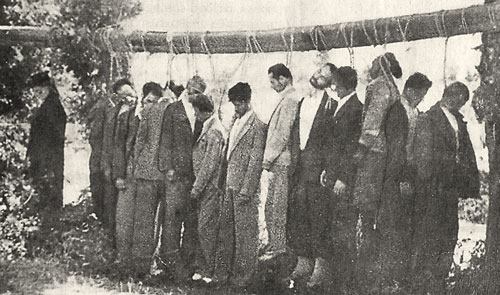
The Turkish point of view regarding the area of Pontus is that Greeks in Pontus were a minority which tried to establish a Greek independent state within an area where there existed a Turkish Muslim majority.
This article, is written to question whether the above statement, can justify the national cleansing that took place during the period from year 1914 to 1922.
The fact is that the Pontians, after 1461, experienced persecutions and attempts for Islamization and extortion. The decision to exterminate the Greeks (and Armenians) was taken by the New Turks in 1911, was implemented during the First World War and was completed by Mustafa Kemal in the period 1919-1923
In December 1916, Emver and Talaat, leaders of the Young Turks, designed a plan of extinction of the Pontians, «the immediate extinction of men of cities from 16 to 60 years and the general exile of all the men and women of the villages in the inland of the East with slaughter and extermination program «. Turkey’s defeat by the Entente forces brought a temporary postponement of the plan to exterminate the Greeks.
During this period atrocities were so harsh that even the Russian communists who were, at the time, supportive towards Turkey, made allegations of Turkish barbarities to Kemal Ataturk who responded:
«I know these barbarities. I am against barbarism. I have given orders to treat the Greek prisoners in a good way … You must understand our people. They are furious. Who should be accused of this? Those who want to establish a «Pontian state» in Turkey”
This is an indication of what was really taking place.
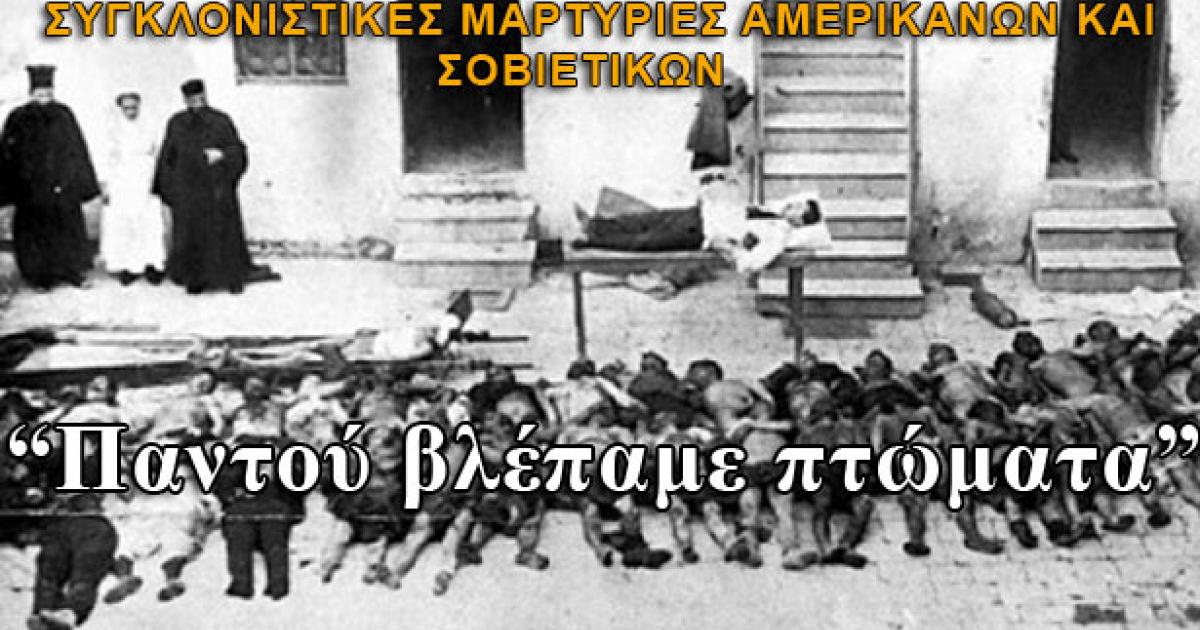
AMERICANS AND SOVIETS WERE SAYING «EVERYWHERE WE WERE SEEING CORPSES»
The genocide of the Greeks in the Pontus was the result of the decision of the Turkish nationalists to resolve the national problem of the Ottoman Empire with the natural extermination of indigenous ethnicities. The normal future of this Empire had been bluntly described by Rosa Luxemburg: «Turkey cannot be born again as a whole because it consists of different countries. No material interest, no common development that could link them had been created! On the contrary, the oppression and the misery of joint submission to the Turkish state are becoming ever greater! This created a natural tendency for the various ethnicities to detach themselves from the whole and to seek through an autonomous existence the way for a better social development. The historic crisis for Turkey had come out: it was going to break up”.
This was the conception that West had at the time for the Ottoman Empire
Of course the situation is different today, so any reference to the past is just for historic reasons, to learn from history to resolve current problems, if possible.
The Black Book of the Pontian Central Council mentions on the genocide the following: «The massacred and in any case exterminated Greeks of the Pontus from 1914 to 1922 amount to the following numbers»: Amasia Region: 134.078, Rodopoli District: 17.479, Chaldeia Region – Kerasounta: 64,582, Neokesareia Region: 27,216, Region. Trebizond: 38,435, Cologne: 21,448: Total: 303,238 people ».
Until the spring of 1924 the Pontians’ martyrdom included another 50,000 victims, the total number of Pontians who were assassinated by March 1924 was 353,000, more than 50% of the total population of the Pontians.
The Pontian genocide forced to abandon their homes and relocate in Greece, the USSR (there were persecuted by the Stalinist regime of the interwar period) period, Iran, Syria, and elsewhere (Australia, USA).
From 1100 BC until 1923 AD, Hellenism of the Pontus was one of the most important parts of the nation. The economic recovery of Pontian Hellenism has been matched by the demographic rise. In 1865 the Greeks of Pontus were 265,000 people In 1880 the Greeks of the Pontus were 330,000. Pontic Hellenism at the beginning of the 20th century numbered 600,000 people, according to estimates by the Ecumenical Patriarchate and the Ottoman authorities. At the same time in southern Russia, in the Caucasus region, there lived about 150,000 Pontians who had moved there after the fall of Trebizond. The main cities of Pontus were Trebizond, Kerasounta, Tripolis, Kotyora, Amisos (Samsonta), Sinope, Nikopoli, Argyroupoli and Amassia. The area was divided into the following 6 metropolises: 1. Trebizond. 2. Rodopoli. 3. Cologne. 4. Chaldia – Kerasounta. 5. Neocaesareia and 6. Amaseia while there were 376 schools, 386 teachers and 23,600 students. Throughout the region 1,047 schools with 1,247 teachers and 75,953 pupils attended. There were also 1,131 temples, 22 monasteries, 1,647 chapels and 1,459 clergy.
Finally, for anybody who wants to learn the real history of this branch of Hellenism can access a very conclusive study in the following link:
http://pontos-genoktonia.gr/sites/default/files/books_text/pontos_justice_and_honor_to_memory.pdf
«We were told that you will win when you submit.
We have subsided and found the ashes.
They told us you will win when you abandon-sacrifice your life.
We sacrificed our lives and we found ashes ….
It remains to revive back to life, now that we have nothing more «.
Seferis Nobel winner, Greek from Asia Minor
